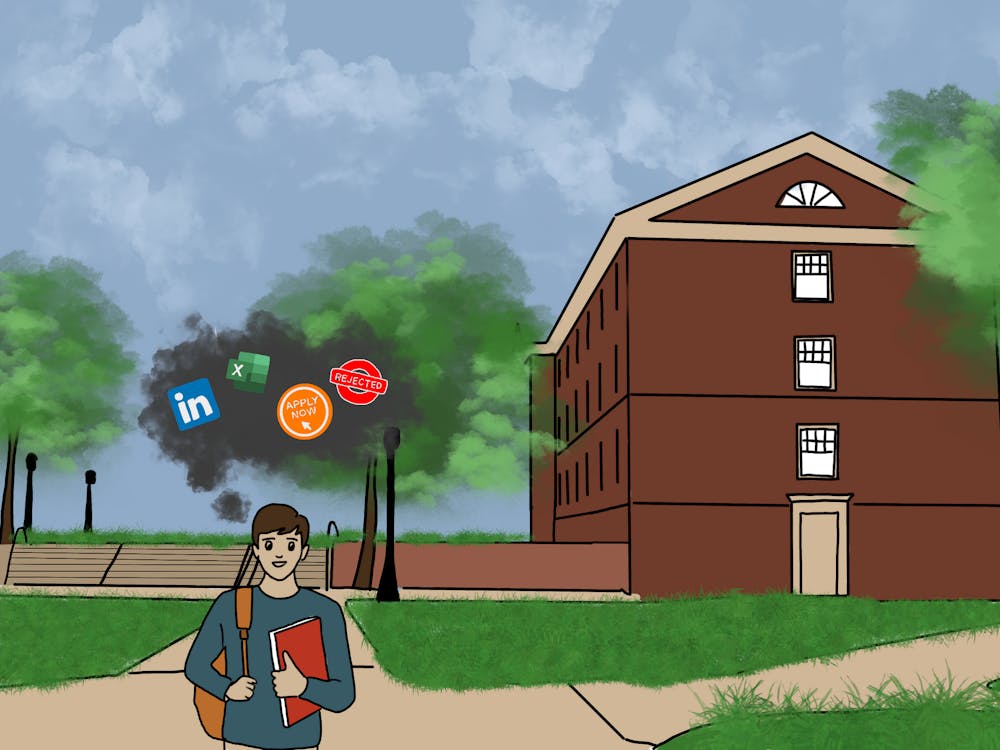You knew you came to college to suff — er, I mean learn, discover, expand your knowledge, broaden your horizons, blah, blah and blah. However, you never knew that you were also here to interpret cryptic messages from your professors. Similar to anthropologists decoding ancient scripts, college students have for ages tried to fathom the true meanings behind certain oft-repeated phrases. But anyways, enough focus on the past, let's focus on your future with professors. Buckle up and let's crack open these codes.
“This will be on the exam”
Alarms, sirens, lights, camera, action! Every single alert system in your body should be going off right about now. A beacon in the tempestuous sea of lectures, whatever phrase followed or came before this needs to be highlighted, bolded, italicized, underlined and everything in between. When a professor emphasizes this, they are not merely suggesting, but rather sending a Morse code message saying, “Trust me, this will be your biggest regret if you do not listen to this.” This is not just about highlighting or underlining — it is about internalizing. This information not only needs to be embedded into your brain, but it also needs to be part of your personality until the exam. It is their subtle way of telling you where the treasure is buried on the vast map of information.
“This is not a mandatory reading”
This is, technically, the biggest lie in college. While the reading material might not directly be on the exam, it will definitely help you understand what the professor was saying the whole two hours that you definitely were not paying attention in class. Think of this as the secret ingredient in a recipe. Sure, the dish can do without it. But with it? Culinary delight. So, while you might not be questioned directly, this "non-mandatory" material often forms the backbone of thought-provoking questions, essay prompts, or seminar discussions. This is the professor’s way of separating the wheat from the chaff, determining who is merely floating by and who is diving deep into academic waters. With that being said, I am a casual drowner and do not even float by.
“I will wait until everyone is quiet”
Ah, a classic professorial comment that is usually accompanied by a stare-down. It is not just a pause — it is a power move. A true checkmate, really. Every moment of silence is a countdown, an unspoken duel between the professor and the chatterbox. Usually, just a chatterbox that thinks they are a volunteer TA for the class and believe the class simply cannot be conducted without their input every two seconds. It is a call to order, a plea for respect and a quiet assertion from professor to student that “this is my domain.”
Chatting students are not just contending with a schedule — they are playing with the professor's patience. And you know these professors do not even have a spare minute to silence you. So, when you hear this line, it is a code for “Last chance to redeem yourself before I unleash the Kraken.”
“Participation counts toward your grade”
This is not just about raising your hand or nodding now and then. It is the professor's radar scanning the room for active engagement. It is their way of saying, “I see you. All of you. Including you in the back, scrolling through memes, and you — the one in the middle — nodding off.” It is their way of saying, “I see you and I wish I was you.” Participation is their metric of measuring who is truly present and who is just warming the seat. They are building a mental leaderboard, and trust me, you want to be on the top.
“Feel free to email me with questions”
A welcoming invite, but with a silent footnote. While, yes, you can email them instead of taking up their 15-minute break post-class, this is not a free pass to bombard them with last-minute queries or questions clearly answered in the syllabus. It is an olive branch, with the hope that students use it judiciously. What it is not, is permission for a frantic email ten minutes before a test asking about a topic that was covered the first week of class. This is the only vulnerability your professor will display the whole year — I suggest you use it wisely.
“Office hours are there for a reason”
This is a polite way of saying you are wasting their time, or a gentle reminder that if you used office hours, then maybe you would not have gotten a 30 percent on the midterm. This is, of course, not a personal experience, just a general note for your benefit.
A professor's office is like a mythical realm — a place of wisdom, insight and sometimes just a bit of casual banter. They are subtly urging you to step into their world, seek clarity, share ideas or even just connect on a human level. But, lurking behind this invitation is also a plea — “Please don’t make me explain complex theories in a chain of endless emails.”
In the vast, intricate dance of academia, professors and students pirouette around each other, each trying to understand the other's moves. As students, decoding these phrases is more than just seeking clarity — it is about survival. And sometimes, yes, it is survival of the fittest. So, I encourage you to be vigilant and come out on top. As you master this linguistic ballet, remember — behind every cryptic professorial phrase, there is a world of wisdom, a hint of humor, and an invitation to engage, learn, and grow — and, quite possibly, be humbled.







